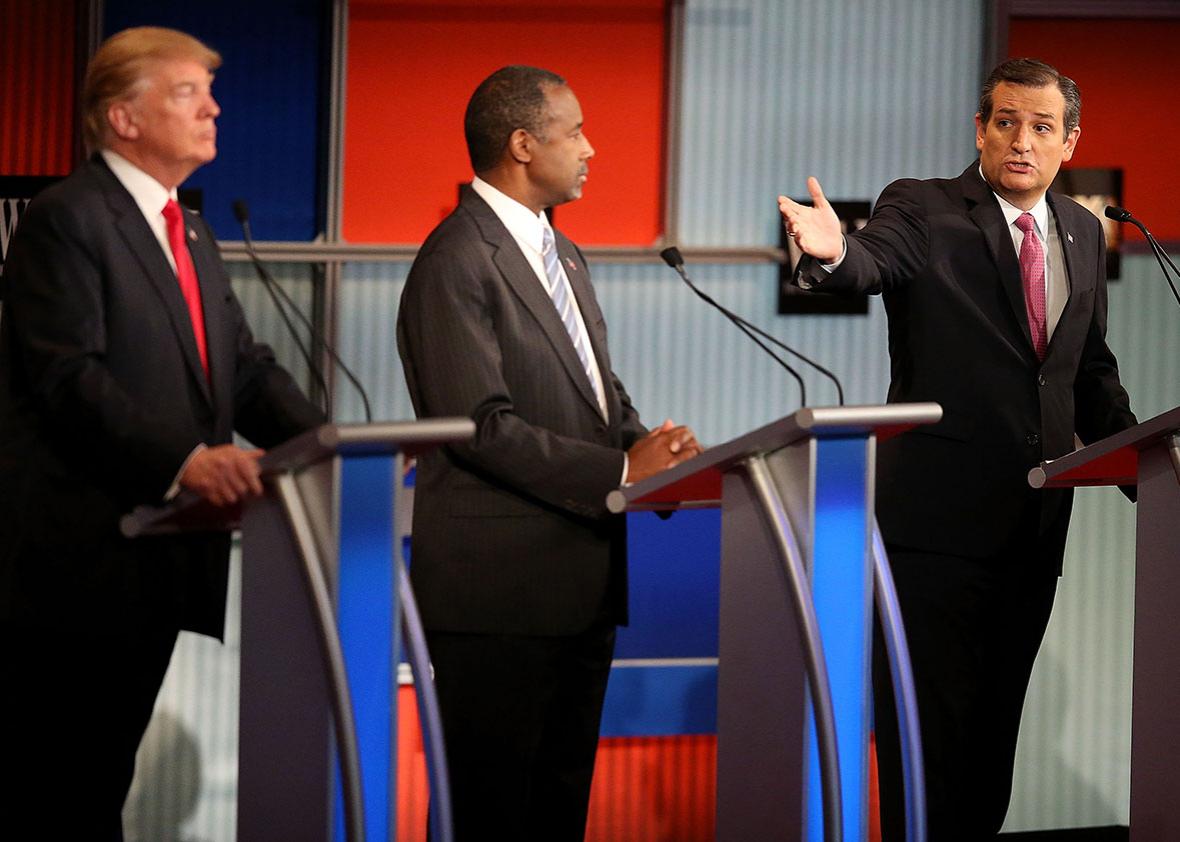The Republican Party isn’t sure it can beat Donald Trump. Its leaders fear a backlash, donors fear Trump’s attacks, and its candidates still trail in the polls. According to the latest CNN survey, 36 percent of registered GOP voters and Republican-leaning independents endorsed Trump for the nomination. His nearest competitor? Texas Sen. Ted Cruz with 16 percent support. Sen. Marco Rubio, the clear establishment choice, trails with just 12 percent. Zoom out from this poll, and the picture looks the same: In the RealClearPolitics average, Trump holds 30.8 percent support, to 17.5 percent for Ben Carson and 13.5 percent for Cruz and Rubio.
It’s too soon to say that Trump will win or lose, but he clearly could win, and if he does, what will the party do?
In a seven-page confidential memo, uncovered by the Washington Post, the head of the National Republican Senatorial Committee advises candidates to “grab onto the best elements of [his] anti-Washington populist agenda.” “Trump has risen because voters see him as authentic, independent, direct, firm—and believe he can’t be bought,” writes NRSC executive director Ward Baker. “These are the same character traits our candidates should be advancing in 2016.”
Baker advises candidates to walk this line on issues like immigration and trade as well, where Trump has used nativism and xenophobia to propel himself to the top of the polls. “Trump will continue to advance those messages, but you don’t have to go along with his more extreme positioning,” he writes. “Instead, you should stake out turf in the same issue zone and offer your own ideas.”
Baker is trying to talk around it, but he’s encouraging candidates to play with Trump’s fire in a nice way. Run against unauthorized immigrants, but don’t call them “rapists”; raise the specter of dangerous black criminals or “Trojan horse” refugees, without saying it outright.
The race for the Senate is just beginning, but we don’t have to search hard to see this advice at work. Just follow Ted Cruz’s presidential campaign. Cruz isn’t just treating Trump with a light touch—avoiding confrontations and criticism—he’s borrowing his basic frame, without the same kind of inflammatory rhetoric. Unlike Trump, Cruz won’t endorse bogus crime statistics from a white nationalist Twitter account, but he will warn his listeners that “the overwhelming majority of violent criminals are Democrats” and that “the Democrats know convicted felons tend to vote Democrat.”
On the same score, Cruz won’t make a blanket attack on all Latino immigrants, but he will come close to that line when he tells conservatives that “the Democrats are getting more and more open that they are the party of illegal immigration. … They support amnesty. They support releasing criminal illegal aliens.” And while Cruz hasn’t gone the full-Trump on refugees—the Republican polling leader is opposed to all refugees from Syria, full stop—he does support a religious test for accepting any refugees into the country. “There is no meaningful risk of Christians committing acts of terror. If there were a group of radical Christians pledging to murder anyone who had a different religious view than they, we would have a different national security situation,” said Cruz last month.
Right now, Cruz is the respectable Trump—same basic message, but with real credentials, a strong organization, and an air of seriousness. And if Trump leaves the race, Cruz is poised to earn his supporters and turn them into real fuel in the race for the nomination (judging from the CNN poll, he’s already winning Carson supporters to his side). It all adds up to an interesting question: Cruz is despised in the Senate and hated by GOP elites, but compared with Trump, he’s almost mainstream. He’s acceptable.
Put differently, we know Republican elites are terrified of Trump. But are they so terrified that they would take Cruz instead? And if the primaries come, and Cruz is ahead of the pack—or at least ahead of Marco Rubio, whose potential has yet to show in the polls—will the party take Cruz as the best choice in a buffet of bad ones?
